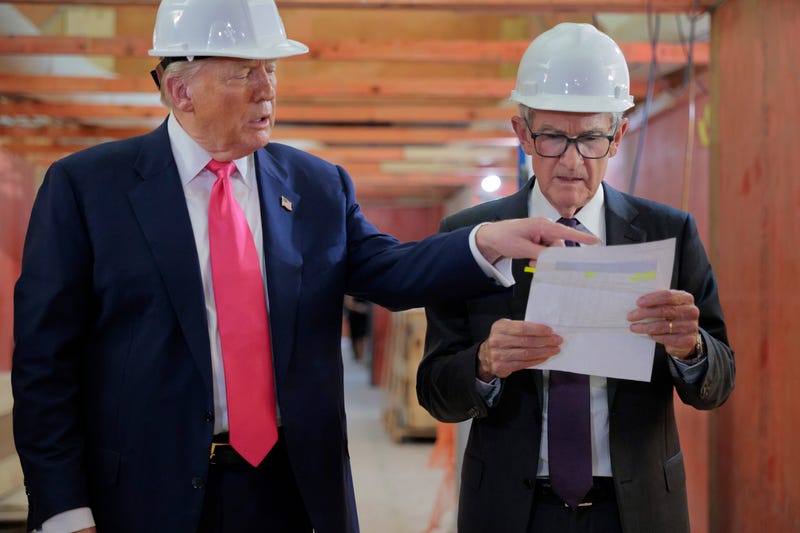
On Wednesday, the Federal Reserve will announce its latest decision on interest rates and it's a raging touchpoint for the White House and President Donald Trump who has been loudly critical of the Fed and Fed Chair Jerome Powell.
Trump has been loudly and angrily calling for the Fed to cut interest rates, a move that could help give the economy a boost. But Powell has been insisting that he wants to wait for more data about how Trump’s tariffs are affecting the economy and inflation before the Fed makes its next move. Lower interest rates also can give inflation more fuel, and the economy only recently came out of its scarring run where inflation briefly topped 9%.
CBS News Business Analyst Jill Schlesinger says chances are, things will stay the same - for now.
"There's a very, very slim chance that the Fed does anything," Schlesinger said on the WCCO Morning News with Tom Hauser. "The reason is that they are trying to really gauge what is going on in the economy. There's some cross currents right now. So, they know that tariffs, we're knocking out some deals and tariffs are coming online. And they are starting to kind of work their way through the economy. In some places, it shows up, so obviously, if you're going to go buy a new car in the next few days and few months, things are going to be a little bit more expensive than they were."
Trump and European Commission President Ursula von der Leyen have announced a sweeping trade deal Monday that imposes 15% tariffs on most European goods, warding off Trump's threat of a 30% rate if no deal had been reached by Aug. 1.
The tariffs, or import taxes, paid when Americans buy European products could raise prices for U.S. consumers and dent profits for European companies and their partners who bring goods into the country.
Schlesinger's thought that the Fed will wait despite that deal is shared across Wall Street where the expectation is that the Fed won't move until September at the earliest to resume cutting interest rates. A couple of Trump’s appointees could dissent in the vote though. The Fed has been on hold with interest rates this year since cutting them several times at the end of 2024.
"The Fed is more concerned with whether or not things spread in a more, kind of almost like an insidious way that like everything's going up, even things that are not tariff related," Schlesinger explains. "And so, they're waiting to see whether or not we get any example of that. So far, as I said, we have data that show us that that tiny little tick up, a tiny little tick up in the inflation rate, not big, and we also have some evidence that the economy is slowing down. So the Fed is really trying to balance these two things."
This week will also feature several potentially market-moving updates about the economy. On Tuesday will come reports on how confident U.S. consumers are feeling and how many jobs openings U.S. employers were advertising. Wednesday will show the first estimate of how quickly the U.S. economy grew during the spring, and economists expect to see a slowdown from the first three months of the year.
On Thursday, the latest measure of inflation that the Federal Reserve prefers to use will arrive. A modest reading could give the Fed more leeway to cut interest rates in the short term, while a hotter-than-expected figure could make it more cautious.
And Friday will bring an update on how many more workers U.S. employers hired during June than they fired.
Schlesinger says the inflation numbers, and what consumers are willing to spend, will have a major impact on what the Fed decides to do this fall.
"Last week, Chipotle released its earnings and they weren't good," she says. "So people are starting to pull back, like maybe $15 for my little burrito lunch, not so great anymore. And if that's happening just at Chipotle, could it start happening elsewhere? Could we start seeing individuals, consumers pull back on their spending that would in fact slow down the economy?"
Schlesinger says if that is actually what is happening, the Fed will start to move on rates.
"Then I think the path forward is that the Fed will be lowering rates in the near term, not keeping them steady," she explains. "I think they're going to be forced if things slow down, that's what will force the Fed's hand, not the president saying nasty things about them."
But, that's probably more likely to happen in September and not this week she added.
Treasury yields held relatively steady in the bond market ahead of all that action. The yield on the 10-year Treasury was remaining at 4.40%, where it was late Friday. The two-year Treasury yield, which more closely tracks expectations for Fed action, edged up to 3.92% from 3.91%.
In stock markets abroad, indexes were mixed in Europe amid mostly modest movements following the announcement of the trade deal’s framework.
Chinese stocks rose as officials from the world’s second-largest economy prepare to meet with a U.S. delegation in Sweden for trade talks. Stocks climbed 0.7% in Hong Kong and 0.1% in Shanghai.
Indexes were mixed across the rest of Asia, where Japan’s Nikkei 225 fell 1.1% for one of the world’s bigger losses. Doubts surfaced over what exactly last week’s trade truce between Japan and Trump entails, especially Japan’s $550 billion pledge of investment in the U.S.
Terms of the deal are still being negotiated, and nothing has been formalized in writing, said an official who insisted on anonymity to detail the terms of the talks. The official suggested the goal was for a $550 billion fund to make investments at Trump’s direction.
